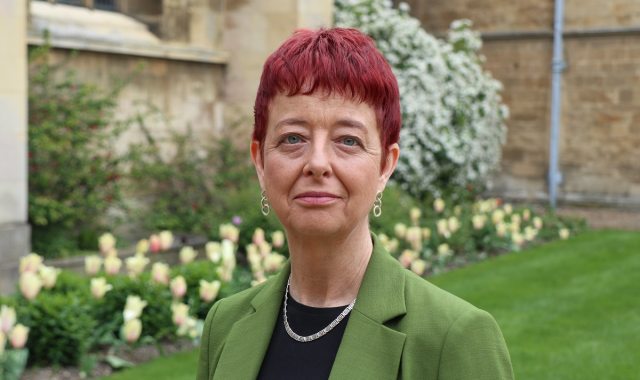Leading the way
- 26 September 2022
- 4 minutes
For Ashna Biju (Medicine 2018), Gonville & Caius College was the natural choice due to its medical pedigree and the size of the undergraduate intake.
After experiencing challenges with her medical education, especially with disruptions from the Covid-19, Ashna is now seeking to make lasting improvements in accessibility.
Having completed her pre-clinical studies, Ashna is now embarking on her clinical studies. While this would have been challenging on its own, the pandemic made this harder, and for Ashna, who has moderate-severe hearing loss, this was an even bigger task.
She struggled with lip-reading in the era of face masks. She also could not use a conventional stethoscope, and on seeking help, found that other people also knew very little on modified stethoscopes for deaf healthcare staff.
She says: “I rely a lot on lip reading and if I’m familiar with someone’s voice then it’s easier. In hospitals patients were OK because they tended not to be wearing masks on wards. It was other doctors.
“I’m talking to people in the clinical school trying to make things more accessible in future; not just for me.”
Ashna does not wish to be defined by her disability. However, she knows by speaking she can improve the situation for those who follow her path. For anyone considering applying, but hesitant, she has the following message.
Don’t let your disability stop you. You’ve got this far with your disability. Don’t pull yourself out of the race before you’ve started
“Don’t let your disability stop you. You’ve got this far with your disability. Don’t pull yourself out of the race before you’ve started,” she adds.
“It is understandable that it is more difficult in some respects compared to other people. Try and find the right support systems, and make sure you ask for help. You are not a burden. It’s not your responsibility or your fault for needing other arrangements.”
Among her work, she is also seeking to improve the medical curriculum, such as their communication course and she led a workshop for the course leaders on making sessions more accessible for disabled students.
Ashna was born in India where she attended kindergarten. School teachers said she was not listening in class, and the same happened after she moved to the United Kingdom aged five. Finally, she was diagnosed with sensorineural hearing loss and has worn hearing aids since.
She says: “The NHS has been amazing supporting me and my parents. Back in India, things could have been different. Who knows? I am very grateful to my parents for supporting me throughout my life.
“My decision to pursue medicine was definitely based on my experience.”
Ashna adds that there are perks as well! She is able to enjoy a noise-free sleep and listen to music through her hearing aids. She also likes to remove her hearing aids at the end of the day, to give her brain a rest.
She adds: “The hearing aids make sounds louder, but not necessarily clearer. A misconception people have is that my hearing should be normal with hearing aids. It’s more like trying to put a jigsaw puzzle together.
“I hear bits of what people say but there is a lot of processing I have to do to make sure I’ve heard everything.”
Social situations – like nightclubs or dining in Hall – are a challenge for Ashna, where groups and background noise make auditory processing harder. She feels grateful to her friends who help her through these situations, but still wonders how it might have been without her disability.
She is motivated to help others. She was the Disabilities and Mental Health Officer for the Gonville & Caius Students’ Union in her first year, and last year, she was the social media manager for the Cambridge Period Project, seeking to eradicate period poverty. The group has ensured equal distribution of period products across colleges at Cambridge and is working across the local community.
She is involved in accessibility work throughout the University and the faculty and wants to do more. She has started a blog (https://ashnabiju.com/), a resource she hopes to build to help other disabled students.
“I wanted to write about my experiences as a deaf medical student, and I wanted to build up something that I would have wanted when I was younger. This was one way I could give back.” she adds.
It is clear it is one of many.
:: Caius’ accessibility information is published on the College website.
ends


